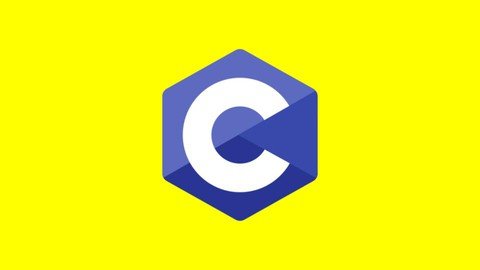
Last updated 1/2021
MP4 | Video: h264, 1280x720 | Audio: AAC, 44.1 KHz
Language: English | Size: 241.39 MB | Duration: 0h 53m
This course is ideal for the students to prepare for their job interviews and for the C, CPP programmers
What you'll learn
Pointers in C and C++
Dynamic memory management in C and C++
Call by reference
Datatypes of pointers
Pointers, arrays and strings
Pointer to a structure in C
Requirements
You will need to have a computer or a mobile handset with an internet connection
Prior knowledge in C and C++ will be needed
Description
C is one of the most powerful programming languages and a must learn for anyone interested in programming. Unlock the full power of C and C++ by learning pointers in C and C++.Pointers are special variables that are used to store addresses. Let's say, you have 5 values stored in the memory of your computer. A pointer points to the address of the memory space where a certain value is stored. A variable stores the value of an object. But a pointer points to the address where the value is stored in the memory. For example, in order to point to A, a pointer will point to its memory address 1000.Now to point to D the pointer will point to its address 1003.Let's say, we have a variable X. And the value of the variable X is 7.The pointer pointing to X is not 7. The pointer pointing to X is the base address where the value 7 is stored.It's like if you are holding a pen for me in your hand, instead of saying I want the pen, I am saying I want whatever you have in your hand. So I am pointing to the hand that is holding the pen. Pointers work something like this.Let's see how pointers work in programming. We have talked about the variable X that has value 7. We will now define that. This is how we define X.int X = 7;Let's say, the value of X, i.e. 7 is stored in the memory location 1000. In order to learn about pointers we need to learn about two operators, & and *.Operator & will give us the address of the variable. & operator is 'address of' operator. So,&X = 1000.Operator * will give us the content of an address. * operator is 'content at' operator. So,*(&X) = *(1000) = 7.
Overview
Section 1: Introduction To Pointers And Pointer Variables
Lecture 1 Introduction To Pointers
Lecture 2 Introduction To Pointers - Notes
Lecture 3 Dynamic Memory Management In C
Lecture 4 Dynamic Memory Management In C - Notes
Lecture 5 Pointers And Functions
Lecture 6 Pointers And Functions - Notes
Section 2: Datatypes And Pointers
Lecture 7 Datatypes Of Pointers
Lecture 8 Datatypes Of Pointers - Notes
Lecture 9 Pointers Arrays Strings
Lecture 10 Pointers Arrays Strings - Notes
Lecture 11 Pointer To A Structure In C
Lecture 12 Pointer To A Structure In C - Notes
Section 3: Pointers And Dynamic Memory Management In CPP
Lecture 13 Introduction To Pointers In CPP
Lecture 14 Introduction To Pointers In CPP - Notes
Lecture 15 Dynamic Memory Management In CPP
Lecture 16 Dynamic Memory Management In CPP - Notes
Students who want to keep hold of a knowledge-base for their job interviews,Professionals who frequently code in C and C++ using pointers
Homepage
Code:
https://www.udemy.com/course/pointers-in-c-and-cpp-for-job-interviews-by-spotle/Recommend Download Link Hight Speed | Please Say Thanks Keep Topic Live
DONWLOAD FROM RAPIDGATOR
https://rapidgator.net/file/b0e873f...f55/ytkmf.Pointers.In.C.And.Cpp.By.Spotle.rar.html
DONWLOAD FROM UPLOADGIG
https://uploadgig.com/file/download/bb9d2b24077bA3a0/ytkmf.Pointers.In.C.And.Cpp.By.Spotle.rar
DOWNLOAD FROM NITROFLARE
https://nitroflare.com/view/801C98DF07112BF/ytkmf.Pointers.In.C.And.Cpp.By.Spotle.rar
Links are Interchangeable - No Password - Single Extraction
